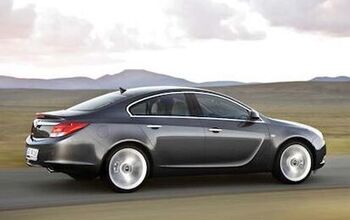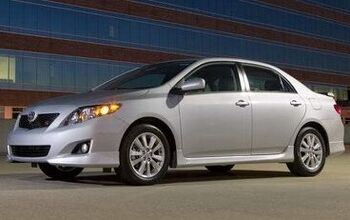Ford Fondly Remembers Cash for Clunkers

With social distancing measures throwing automotive sales straight into the dumpster, Ford is reportedly getting ready to float some interesting ideas by the U.S. government. It’s vying for a stimulus deal aimed at giving the industry a jump start after the health crisis posed by the novel coronavirus subsides.
One of the models Ford’s pushing is unsettlingly familiar.
According to Bloomberg, Mark LaNeve — Ford’s vice president of U.S. marketing, sales and service — is fondly reminiscing about Cash for Clunkers and thinks it’d be a great way to bolster auto sales after COVID-19 takes a hike.
“We think some level of stimulus somewhere on the other side of this would help not only the auto industry and our dealers, which are a huge part of our overall economy, but will help the customers as well,” LaNeve explained to the outlet over the phone. “We’re in discussions about what would be the most appropriate.”
From Bloomberg:
Those discussions are internal at Ford for now, but are eventually expected to involve the federal government, LaNeve said a day after automakers reported their slowest monthly pace of U.S. sales in a decade. One model being considered is the 2009 “cash for clunkers” program that helped stimulate auto sales following the global financial crisis by encouraging drivers to turn in an older car in exchange for thousands of dollars toward buying a new one.
“Cash for clunkers was very effective at that time,” LaNeve said. “It would be nice to think we could have something equally as effective for 2020 when we get out of this because it was a great program.”
Let’s reexamine the recession-era Car Allowance Rebate System (aka Cash for Clunkers) the government enacted in 2009 to see if LaNeve has his lid on straight. The system was intended to provide economic incentives (money vouchers valued between $2,500 and $4,500) to encourage U.S. residents to purchase new vehicles with greater fuel economy amid the Great Recession, provided they had something older to trade in. But stimulating a weak economy was only half the equation; the Obama administration also hoped it would reduce pollution and put more Americans into safer cars.
In terms of participation, the program was a success. Within a month of being introduced the appropriated funds were exhausted, forcing Congress to approve an additional $2 billion (bringing the grand total to $3 billion). That first month saw a significant increase in auto sales (mostly for Japanese brands). While there are conflicting studies regarding what happened afterward, sales were noticeably down in the proceeding months. A study published in the Quarterly Journal of Economics in 2012 framed it as a wash, saying “the effect of the program on auto purchases is almost completely reversed by as early as March 2010 — only seven months after the program ended.”
Subsequent studies backing up those claims, few of which bother dive into the high number of used vehicles that were destroyed or failed to become charitable donations to local organizations. Depending upon who crunched the numbers, Cash for Clunkers was either economically neutral or resulted in short term gains that ultimately resulted in a net loss. The popular public presumption embraces the latter scenario and echo countless articles written after 2009. Those that came before tend to have a comparatively optimistic opinion of the scheme.
From an environmental standpoint, the program seems to have worked slightly better. Most studies peg Cash for Clunkers as reducing anywhere from 5 to 30 million tons of carbon emissions from vehicle tailpipes. That’s quite the spread, however, and most experts agree that the recession, in addition to abnormally high fuel prices, was already pushing consumers into smaller automobiles with superior fuel economy. The Car Allowance Rebate System was unlikely to be the contributing factor here, with even its advocates suggesting the environmental improvements were minimal and costly.
With the above in mind, we are hoping Ford has other ideas it’s willing to float by the federal government — because a re-do of Cash for Clunkers seems undesirable when viewed broadly. It’s understandable why the company would be interested in a stimulus deal of some kind. Ford reported a 12-percent decline in first quarter U.S. deliveries on Thursday. With its core rivals undoubtedly enduring similar losses, we expect other automakers to embrace whatever help the government can offer.
[Image: Paul Brennan/Shutterstock]

A staunch consumer advocate tracking industry trends and regulation. Before joining TTAC, Matt spent a decade working for marketing and research firms based in NYC. Clients included several of the world’s largest automakers, global tire brands, and aftermarket part suppliers. Dissatisfied with the corporate world and resentful of having to wear suits everyday, he pivoted to writing about cars. Since then, that man has become an ardent supporter of the right-to-repair movement, been interviewed on the auto industry by national radio broadcasts, driven more rental cars than anyone ever should, participated in amateur rallying events, and received the requisite minimum training as sanctioned by the SCCA. Handy with a wrench, Matt grew up surrounded by Detroit auto workers and managed to get a pizza delivery job before he was legally eligible. He later found himself driving box trucks through Manhattan, guaranteeing future sympathy for actual truckers. He continues to conduct research pertaining to the automotive sector as an independent contractor and has since moved back to his native Michigan, closer to where the cars are born. A contrarian, Matt claims to prefer understeer — stating that front and all-wheel drive vehicles cater best to his driving style.
More by Matt Posky
Latest Car Reviews
Read moreLatest Product Reviews
Read moreRecent Comments
- Redapple2 I gave up on Honda. My 09 Accord Vs my 03. The 09s- V 6 had a slight shudder when deactivating cylinders. And the 09 did not have the 03 's electro luminescent gages. And the 09 had the most uncomfortable seats. My brother bought his 3rd and last Honda CRV. Brutal seats after 25 minutes. NOW, We are forever Toyota, Lexus, Subaru people now despite HAVING ACCESS TO gm EMPLOYEE DISCOUNT. Despite having access to the gm employee discount. Man, that is a massive statement. Wow that s bad - Under no circumstances will I have that govna crap.
- Redapple2 Front tag obscured. Rear tag - clear and sharp. Huh?
- Redapple2 I can state what NOT to buy. HK. High theft. Insurance. Unrefined NVH. Rapidly degrading interiors. HK? No way !
- Luke42 Serious answer:Now that I DD an EV, buying an EV to replace my wife’s Honda Civic is in the queue. My wife likes her Honda, she likes Apple CarPlay, and she can’t stand Elon Musk - so Tesla starts the competition with two demerit-points and Honda starts the competition with one merit-point.The Honda Prologue looked like a great candidate until Honda announced that the partnership with GM was a one-off thing and that their future EVs would be designed in-house.Now I’m more inclined toward the Blazer EV, the vehicle on which the Prologue is based. The Blazer EV and the Ultium platform won’t be orphaned by GM any time soon. But then I have to convince my wife she would like it better than her Honda Civic, and that’s a heavy lift because she doesn’t have any reason to be dissatisfied with her current car (I take care of all of the ICE-hassles for her).Since my wife’s Honda Civic is holding up well, since she likes the car, and since I take care of most of the drawbacks of drawbacks of ICE ownership for her, there’s no urgency to replace this vehicle.Honestly, if a paid-off Honda Civic is my wife’s automotive hill to die on, that’s a pretty good place to be - even though I personally have to continue dealing the hassles and expenses of ICE ownership on her behalf.My plan is simply to wait-and-see what Honda does next. Maybe they’ll introduce the perfect EV for her one day, and I’ll just go buy it.
- 2ACL I have a soft spot for high-performance, shark-nosed Lancers (I considered the less-potent Ralliart during the period in which I eventually selected my first TL SH-AWD), but it's can be challenging to find a specimen that doesn't exhibit signs of abuse, and while most of the components are sufficiently universal in their function to service without manufacturer support, the SST isn't one of them. The shops that specialize in it are familiar with the failure as described by the seller and thus might be able to fix this one at a substantial savings to replacement. There's only a handful of them in the nation, however. A salvaged unit is another option, but the usual risks are magnified by similar logistical challenges to trying to save the original.I hope this is a case of the seller overvaluing the Evo market rather than still owing or having put the mods on credit. Because the best offer won't be anywhere near the current listing.


































Comments
Join the conversation
Don't confuse us with facts, there's baseless and ill-informed outrage to indulge!
This time around, a lot of the clunkers off my head are: 1. Nissan with CVT problems 2. Hyundai with engine problems 3. Honda with auto transmission problems 4. European with all sort of reliability problems 5. GM with lower intake manifold problems etc etc Those middle age cars with reliability problems, we will get rid of them. Those nuclear war proof little cars will live.